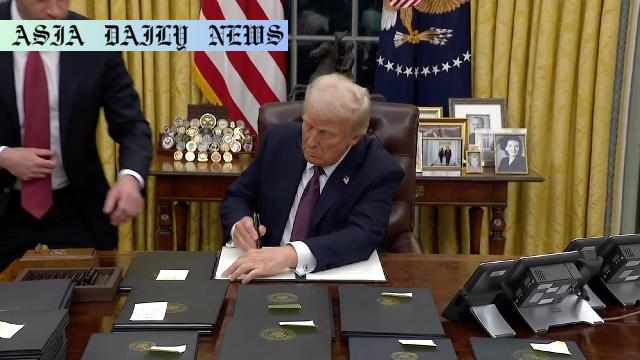Democratic-led states file lawsuits against an executive order restricting birthright citizenship, asserting constitutional violations.

Introduction
The political climate in the United States has once again heated up as 22 Democratic-led states have filed lawsuits against an executive order signed by President Donald Trump. The order aims to restrict birthright citizenship, which has long been a cornerstone of U.S. immigration policy and guaranteed by the 14th Amendment. This controversial move challenges established precedents around citizenship laws, intensifying the ongoing national discourse about immigration and constitutional limits on presidential power.
The Essence of Birthright Citizenship
Birthright citizenship, also known as jus soli or “right of the soil,” is the legal principle granting automatic citizenship to individuals born within a country’s territory. In the United States, the 14th Amendment to the Constitution explicitly states, “All persons born or naturalized in the United States, and subject to the jurisdiction thereof, are citizens of the United States and of the state wherein they reside.” This clause has historically been interpreted as a guarantee of automatic citizenship to children born in the U.S., regardless of their parents’ immigration status or nationality.
Trump’s Executive Order and Its Implications
On Monday, President Trump signed an executive order that takes steps to exclude children born on U.S. soil from automatic citizenship if their parents fall into specific categories. Specifically, the order targets children whose mothers are either residing in the U.S. illegally or temporarily and whose fathers are neither U.S. citizens nor legal permanent residents. While the text of the executive order expresses concerns about “birth tourism” and unauthorized immigration, critics argue it undermines core constitutional rights and demeans the inclusive ethos that historically defined the concept of American citizenship.
The Legal Challenge
In a swift response, 22 states, led by Democratic attorneys general, filed lawsuits in federal courts to challenge the constitutionality of Trump’s order. The lawsuits were filed both in Washington, D.C., and San Francisco. These states argue that the executive order is not only unconstitutional but also a violation of Supreme Court precedents. For the plaintiffs, the 14th Amendment is unambiguous in granting citizenship to “all persons born in the United States and subject to the jurisdiction thereof.” New Jersey Attorney General Matthew Platkin, one of the lead plaintiffs, stated, “Presidents in this country have broad powers, but they are not kings.”
Opposing Views and Political Context
Supporters of Trump’s executive order claim it is a necessary measure to curb illegal immigration and prevent abuses of the birthright citizenship system, such as “birth tourism.” They argue that the 14th Amendment’s original framers did not intend for citizenship to extend to children born to unauthorized immigrants. However, this remains a contentious interpretation, as legal scholars and constitutional experts have largely rejected such arguments, viewing the move as legally precarious and politically motivated.
Broader Implications for U.S. Society
The executive order inevitably stirs broader conversations about immigration policy, racial inclusion, and constitutional integrity. On one hand, opponents view it as an attack on the hard-won freedoms enshrined in the Constitution. On the other hand, supporters see it as a bold authority to address perceived loopholes in the nation’s immigration laws. The potential implications extend beyond immigration; they challenge the limits of presidential authority, the balance of power between states and the federal government, and the social contract affirming equality under the law.
Next Steps and Judicial Path
Given existing Supreme Court jurisprudence affirming birthright citizenship, legal experts anticipate that the federal judiciary is unlikely to uphold Trump’s executive order. Analysts expect the case to reach the Supreme Court, where debates about the textual and historical interpretations of the 14th Amendment will take center stage. A key concern will be whether a president can, through executive decree, alter or reinterpret provisions enshrined in the Constitution without the intervention of Congress or the states.
Conclusion
This pivotal legal confrontation underscores the enduring tension between executive power and constitutional guarantees. As America grapples with its identity as a nation of immigrants and its commitment to constitutional governance, the stakes of this case cannot be overstated. Any decision to alter birthright citizenship could set a precedent with profound implications, not just for immigration policy, but for the very definition of American citizenship and democracy.
Commentary
Analyzing the Significance of Birthright Citizenship
The principle of birthright citizenship has always been a contentious and deeply significant aspect of U.S. immigration law. Its inclusion in the 14th Amendment reflects the country’s historic commitment to equality and inclusivity, even in the face of complex social challenges. Trump’s executive order disrupts this long-standing principle and invites us to reflect on what it means to be an American—by birth or by law.
The Threat to Constitutional Integrity
One of the most concerning aspects of this executive order is the potential erosion of constitutional protections. The 14th Amendment has been a cornerstone of American democracy, ensuring that citizenship is intrinsic to all who are born on U.S. soil. Any attempt to undermine such constitutional guarantees sets a dangerous precedent—not just for immigration but for the sanctity and integrity of the Constitution as a whole.
The Politics Behind the Move
The executive order should also be viewed through the lens of contemporary politics. Immigration has remained a polarizing issue, often used to energize voter bases. However, this order not only amplifies divisions but also risks alienating communities already marginalized in the current sociopolitical climate. It raises pressing questions about whether such policies reflect the shared values the nation claims to uphold.
Looking Ahead
Ultimately, the debate over birthright citizenship is more than a legal issue; it is a reflection of America’s soul and its future. The ability of the judicial system to uphold constitutional protections, alongside the resilience of American values, will determine the outcome of this monumental challenge. Regardless of one’s political views, this issue compels all citizens to engage critically in the ongoing discourse about governance, rights, and identity in the United States.


